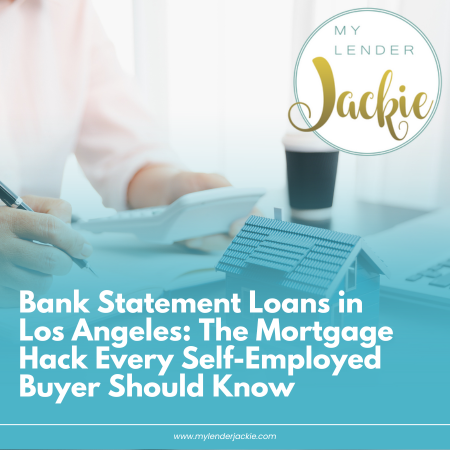
That’s where bank statement loans come in for many of our clients, a flexible, widely used option in Los Angeles that lets us qualify borrowers based on documented deposit history rather than strict W-2s and tax returns.
What Is a Bank Statement Loan?
Put simply, a bank statement loan uses your bank deposit history (typically 12–24 months of statements) to calculate your qualifying income. Instead of relying on reported taxable income on a Schedule C, underwriters analyze recurring deposits, average monthly cash flow, and legitimate business-related inflows to determine what you can afford. This way, you don’t have to choose between maximizing tax benefits and buying a home; you can have both!
Who Typically Uses Bank Statement Loans?
This is who we see benefitting from bank statement loans:
- Small business owners and consultants whose income fluctuates seasonally.
- Entertainers, actors, and creatives paid by gig, residuals, or 1099 contracts.
- Real estate investors and professionals who prefer to keep deductions high.
- High-earning freelancers and digital entrepreneurs with low reported taxable income.
How We Calculate Income from Bank Statements
There are a few methods we can use to verify your income:
- Average deposits method: Sum qualifying deposits over the chosen period and divide to reach a monthly average.
- Business income adjustment: Some lenders remove non-income items (transfers, capital injections) and focus on recurring deposits that represent pay.
- Gross-up factor: For bank statements showing net deposits after expenses, some programs apply a gross-up percentage to estimate pre-tax earnings.
Don’t let these details be a source of stress. Talk with one of our loan officers today to get answers to your specific questions. We specialize in tailoring the process to you.
Benefits of Bank Statement Mortgages in LA
There are some distinct benefits you can enjoy if you choose a bank statement mortgage:
- Flexibility: You don’t have to show 2-year W-2 history or traditional tax returns.
- Preserve tax strategies: Keep business deductions intact without penalizing your mortgage eligibility.
- Faster approvals: Once documentation is ready, underwriters can qualify you quickly.
- Access to higher loan amounts: Many lenders offer bank statement programs for conventional and jumbo loans, which matters in high-cost LA neighborhoods.
What Lenders Typically Require
While requirements vary, you can generally expect to provide:
- 12–24 months of business and personal bank statements (pdfs or transcripts)
- Current credit score and history (many programs want scores 680+ for best terms)
- Proof of reserves (cash, investments) to cover down payment and closing
- Business documentation (entity formation docs, invoices, contracts) in some cases
- A clear explanation of large or irregular deposits
Keep in mind that bank statement loans can come with slightly higher interest rates and fees compared with conventional loans because lenders price in additional underwriting complexity and perceived risk. That said, for many high-earning self-employed buyers the benefit of qualification outweighs a modest rate premium. Always compare offers and factor in the long-term ROI of buying now vs. waiting.
Real-World Example
Imagine an LA creative director who earns $12k–$20k a month on average, but reports a low taxable income due to reinvestment and deductions. With 24 months of bank statements showing consistent deposits, a lender may underwrite using the monthly average — enabling the buyer to qualify for a mortgage size that conventional tax-return-based underwriting would deny.
“Bank statement loans are a practical solution for Los Angeles professionals whose income doesn’t fit the W-2 mold. They let talented people buy the homes they need without changing their tax strategy — and that flexibility is invaluable in a city where freelance and contract work is the norm.” — Jackie Barikhan, Our LA Mortgage Specialist

